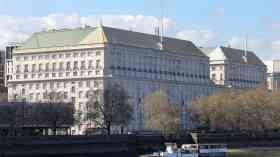Concrete Canvas Ltd is proud to be exhibiting at the International Security Expo for the first time, as we celebrate our 20th year in business.
Government ignored help of local councils for too long
The government’s initial response to the coronavirus crisis was hampered by the absence of a long-term strategy and a lack of clarity about who was responsible for what.
That is the conclusion of a new report, released by the Institute for Government, which examines decisions made in three areas: economic support, coronavirus testing and the lockdown.
The report accuses the government of relying ‘too much on an illusion that following the science would provide the answers’ and therefore deferring decisions on lockdown.
The paper, Decision making in a crisis, also says that Health Secretary Matt Hancock did not give enough thought to what the target of 100,000 tests a day was intended to achieve and how, as well as criticising him for not seeking the input of local public health officials.
The Institute for Government says that the government needed to be clearer about the role of science advice and its limitations, particularly in the early stages of the crisis when it looked to its scientists to generate policy, not just advise on it, and that it was unclear who was responsible for different aspects of the testing regime, which made it difficult to assign responsibility for remedying gaps and failures.
It recommends that the government should: be clearer about the extent to which it wants SAGE to incorporate social and economic concerns into its advice; clearly identify the responsibilities of different departments and agencies where those responsibilities overlap; use rapid consultation to build support for policies and avoid the need for U-turns; use scientific advice to inform rather than determine policy; and develop its strategy before setting targets that will be hard to resile from.
Company Focus
Event Diary
Join us for the landmark 10th Anniversary of the London Build Expo, the UK’s largest and most influential construction and design show.
Retail Supply Chain & Logistics Expo returns to Excel London across 12-13 November, once again bringing together the world of logistics, supply chain, eCommerce and retail innovation for two dynamic days of opportunity.
Every sport, from grassroots football to world-class tournaments, depends on one constant: high-quality playing surfaces and well-maintained green spaces.
Supplier Profiles
Bauder Accepts Keys to its New UK Distribution Centre at Gateway 14
Bauder marked a major milestone in its UK expansion with the official handover of a brand
Words of World: Bridging language barriers with excellence
At Words of World, we specialise in professional translation and interpreting, d
Latest Features
The British Institute of Cleaning Science (BICSc) and the Cleaning & Support Services Association (CSSA) have successfully completed a groundbreaking project aimed at exploring the future of cleaning. This collaboration marks a significant milestone in the cleaning industry, reflecting a shared commitment to embracing innovation with confidence.
The Crown Commercial Service’s (CCS) new framework on Language Services (RM6302), dealing with translation, transcription and interpreting, is live, running from 7th May 2025 to 6th May 2028.














